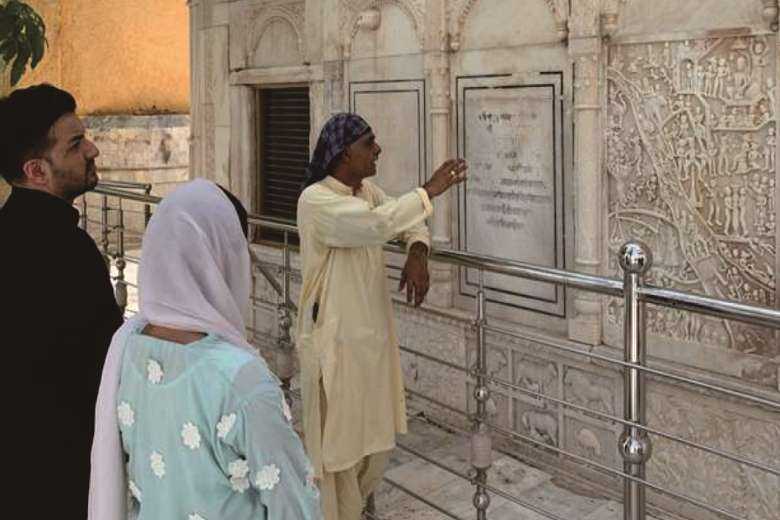
A team from the Legal Aid Society interviews a Hindu pandit of Sadhu Bela temple in Sukkur in Pakistan's Sindh province. (Photo supplied)
Costs and lack of helpful resources are the most prominent barriers for religious minorities in accessing justice in Pakistan, according to a survey by a legal group.
“Religious minorities were less confident about attaining a fair trial compared to their Muslim counterparts. They foremost identified themselves as not affluent and powerful, and therefore not possessing the law to seek protection within its ambit, nor the law taking ownership of them. Consequently, they seldom approach the judicial system to seek justice,” found the Legal Needs Assessment Survey launched on Oct. 20 in Islamabad.
“They repeatedly referenced poverty, and not religious discrimination, as their biggest problem. They identified their minority status as an exacerbator of their poverty. Instead, a dearth of opportunities, corruption and administrative incompetence were the primary suspects.
“These problems are a direct result of poverty and dire living conditions. Structural discrimination, including absence of employment opportunities and lack of provision of legal identities, creates and traps these communities in a problem loop by limiting avenues for awareness and information and thus altering legal behaviors.
“The majority of our respondents were unaware that their problems are legal issues with a predetermined solution. Majority versus minority rhetoric has made our respondents believe that this country is for Muslims and so is the law. The discrimination faced by these marginalized communities is not only external but is also fueled by casteism and socioeconomic disparity within these communities.”
The Karachi-based Legal Aid Society (LAS) concluded the six-month survey in May after interviewing 324 people including Hindus, Christians and Sikhs from eight districts of Sindh province.
If the minorities feel that their rights are being violated, then it is the state's responsibility to make corrections
According to LAS research manager Dawer Hameed, this legal need assessment is the first of its kind in Pakistan.
“Religious minorities in Pakistan face a plethora of social and legal issues. The launch event aims to bring together relevant actors and stakeholders in the judicial system to discuss the barriers faced by minority communities in accessing justice and ideation of possible policy reforms to mitigate these barriers,” he told UCA News.
“If the minorities feel that their rights are being violated, then it is the state's responsibility to make corrections. The state-civil society partnerships can go a long way in helping minorities to access justice.”
Under its Religious Minorities project, LAS has already provided free legal aid to 150 members of minority communities. It aims at holding awareness clinics for 12,000 non-Muslims, especially females.
Twenty-five percent of respondents in the recent survey were women who reported a comparatively higher number of problems in areas regarding consumer rights, land, housing, family, employment/labor and public services.
“Marginalized groups of respondents including women, unemployed individuals and members of the scheduled Hindu caste of Shudr are often more marginalized than their counterparts in facing legal problems and/or hurdles to justice. Caste politics plays a defining role at the intra-community level in Pakistan, and the community’s relationship with broader society is defined by it,” noted LAS.
“The concept of honor governs a women’s behavior and stigmatizes her if she disgraces the household by involving external lawmakers or institutions in what are considered ‘family matters.’ Courts are already considered expensive and inaccessible, and women face additional barriers to access to justice as there are a limited number of female legal staff.
“There is also ambivalence regarding the divorce and dissolution laws, with many women from non-Muslim communities explaining how men from their community are afforded more rights through this colonial-era legislation than they are. Women must overcome all these legal and institutional disadvantages and obstacles to seek the legal recourse they need for domestic issues so that they can receive sufficient alimony to simply survive in an economy that does not value divorced women, much less divorced women from non-Muslim communities.”
Paralegal aid to the affected household adds to the cost. Minority females face further challenges in access to justice
Both government and church committees have been negotiating for decades to update the laws relating to Christian conjugal conflicts covered by the Christian Marriage Act of 1872 and the Christian Divorce Act of 1869. The law currently validates the marriage of a girl older than 13, a condition that conflicts, for example, with regional customs.
A non-Muslim marriage can be invalidated if one of the two parties converts to Islam. In February, the government finalized the draft of a new bill to address the long-standing demand of the Christian minority to address laws governing marriage and divorce.
Kashif Aslam, national coordinator of the Catholic bishops' National Commission for Justice and Peace, supported the LAS survey.
“Lawyers’ fees vary from the nature of the case to the court hearing it. If a blasphemy case is pending for a decade, the fee soars to 2.5 million rupees (US$14,400). Paralegal aid to the affected household adds to the cost. Minority females face further challenges in access to justice,” he said.


